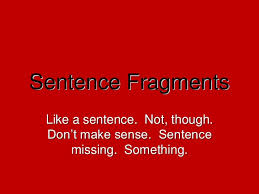Overview
Sentence fragments are writing errors in which a part of a sentence is punctuated as a complete sentence, with a capital letter at the beginning and closing punctuation at the end. However, a sentence fragment may lack a verb, a subject, may only have a verbal noun, or may only be a subordinate clause. Sentence fragments can be corrected by making them into complete sentences or by adding them as extensions to other sentences.
Noun Clauses
A noun clause is a common type of sentence fragment that does not contain a predicate. For example, “The New Horizons spacecraft, with six different types of automatic observation modules” is not a complete sentence. It lacks action. Did it “recently approach the dwarf planet Mars in a flyby mission”? Was it “launched from Earth nine and one-half years ago”? In order to fix a noun clause, finish the fragment with a predicate.
Verbal Clauses
Verbal clauses are sentence fragments that lack subjects. They show action, but no actor. They are rarer than noun clause fragments, but still exist. For example, “Flies across the water” is not a sentence. Is it a bird, a plane, or Superman? In order to fix a verbal clause fragment, finish the fragment by adding the subject, such as “The pelican flies across the water.”
Verbal Noun Clauses
Verbal nouns or gerunds are formed when the suffix –ing is added to the root form of a verb, but the verb then functions as a noun. Most of the time verbal nouns are found as part of a complete sentence, such as “Swimming is good exercise.” Occasionally, they become part of a fragment. “Swimming against the current” is not a sentence. “The salmon were swimming against the current” adds a subject and an auxiliary verb.
Dependent Clauses
The most common type of sentence fragments are dependent clauses, because they cannot stand alone without an independent clause. “After the war was ended” is not a sentence. What happened after the war ended? “After the war was ended, the country began the long process of rebuilding.” “Because I waited outside for hours” is not a sentence. “I went home without seeing them, because I waited outside for hours” is a complete sentence, with an independent clause and a dependent clause.
Interested in English tutoring services? Learn more about how we are assisting thousands of students each academic year.
SchoolTutoring Academy is the premier educational services company for K-12 and college students. We offer tutoring programs for students in K-12, AP classes, and college. To learn more about how we help parents and students in Greenwood, MS: visit: Tutoring in Greenwood, MS




